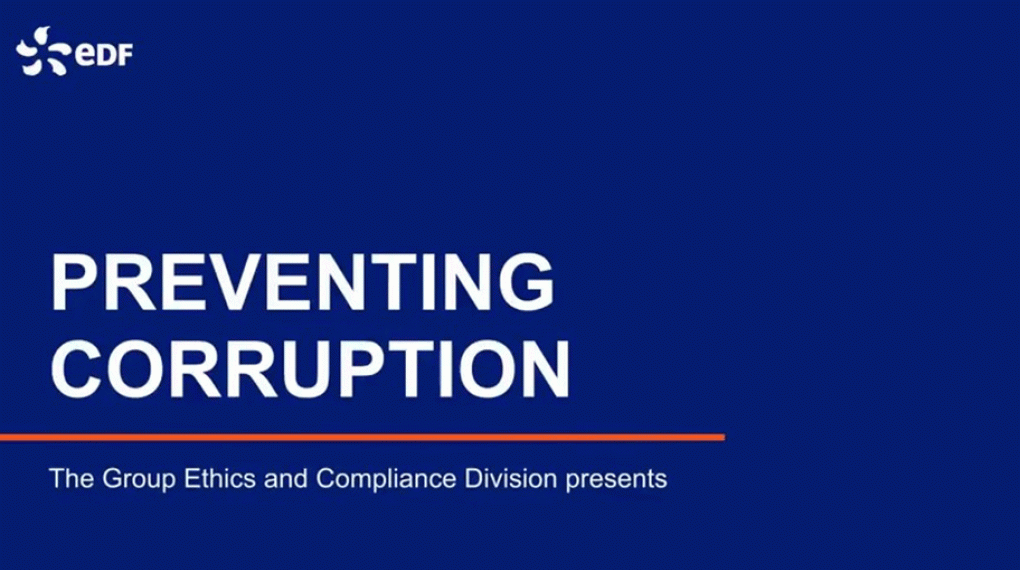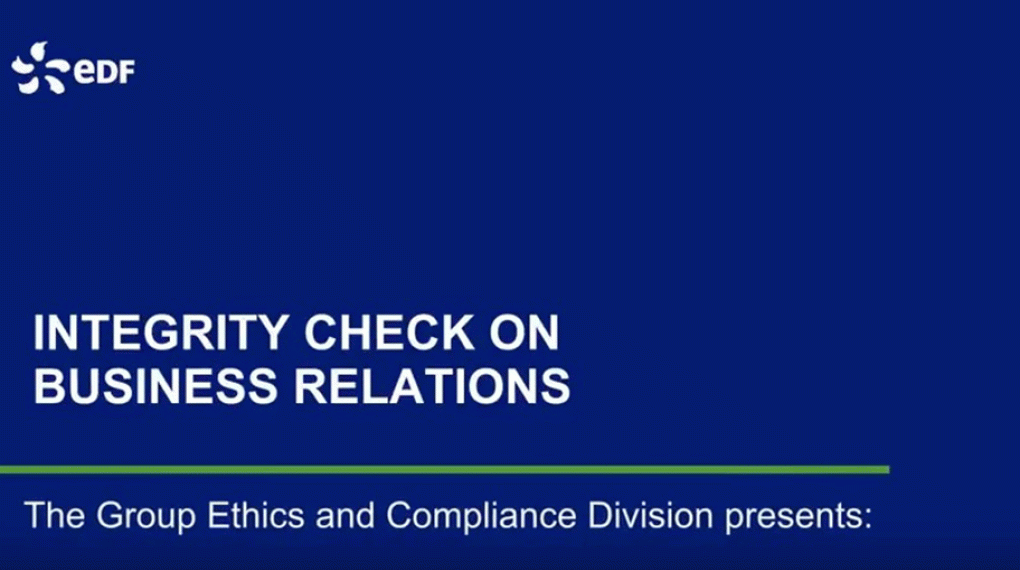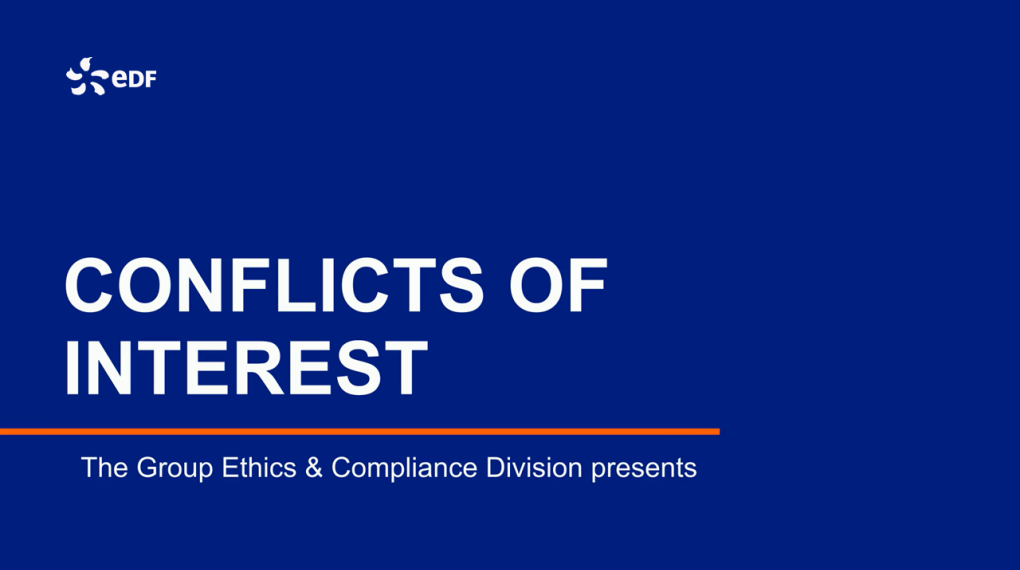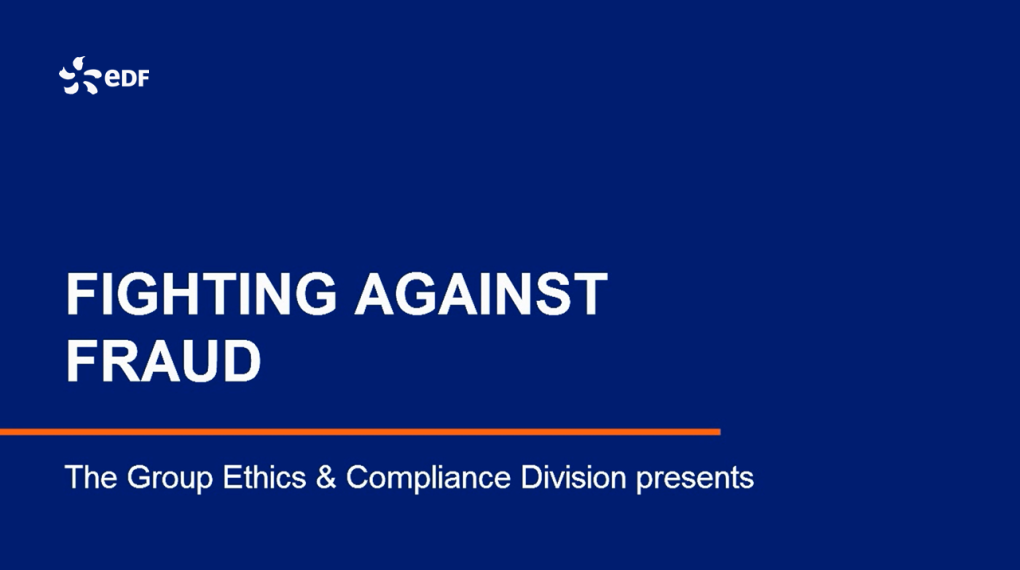Preventing the risk of corruption
The Law of 9 December 2016 on transparency, fight against corruption and modernisation of economic life (Sapin II Act) strengthens the legislative arsenal to bring it up to the very best international standards in the field of preventing and repressing corruption and other breach of probity offences. Companies such as EDF, meeting the criteria of size and turnover, are under the obligation to implement an anti-corruption compliance programme comprising eight requirements: a code of conduct incorporated into the company's rules and regulations, an internal whistleblowing system, a risk mapping, third-party assessment procedures, accounting control procedures, a training system, a disciplinary scheme, and an internal control and evaluation system of the measures put in place.
Since 2017, the Group Ethics and Compliance Division (GECD) and its network of Ethics and Compliance Officers (ECOs) have developed and deployed an anti-corruption compliance programme within the EDF Group in order to meet the eight requirements of Article 17 of the Sapin II law.

Your browser does not support javascript.
To enable you to access the information, we suggest you view the video in a new tab.
Compliance with the requirements of the Sapin II law
1. EDF's Ethics and Compliance Code of Conduct
Since its first publication in the second half of 2017, EDF's Ethics and Compliance Code of Conduct has been updated in the 1st half of 2021 and in the 1st half of 2023. The updated EDF Code of Conduct, which enters into force on 12 June 2023, defines the rules applicable to all employees and those that apply to certain employees due to their duties. It defines and illustrates, in practical cases, the various types of situations that employees may face due to the activity, the organisation of the company, and the behaviour that must be prohibited to protect the company and its employees from any practice likely to characterise acts of corruption, influence peddling, and breaches of probity.
It contains 11 themes that have been identified in a dedicated mapping: preventing corruption; controlling the integrity of business relations; gifts and invitations; preventing conflicts of interest; combating fraud; patronage – sponsorship; representation of interests; preventing market abuse; preventing money laundering and terrorist financing; preventing breaches of competition law; respecting international sanctions and monitoring international trade.
It has been the subject of consultation with staff representatives in accordance with the provisions of the Sapin II Law and the Labour Code on internal regulations.
Any breach of any of the rules in the Code of Conduct may result in disciplinary sanctions.
The deployment of the Ethics and Compliance Code of Conduct issued to all employees is accompanied by an awareness-raising and training programme.
-
Download the EDF Ethics and Compliance Code of ConductPDF - 368.33 KB
Entry into force: 12 June 2023
2. The ethics and compliance whistleblowing system
In 2023, the EDF Executive Committee decided to upgrade the EDF Group's whistleblowing system to take into account the 21 March 2022 law, known as the Waserman law, which aims to strengthen the protection of whistleblowers. This system, consisting of the whistleblowing collection and handling procedure and a simplified and instructive alert support guide, therefore includes the changes required by the legislator, and simplifies the procedure to facilitate uniformity in the handling of alerts within the Group. This single whistleblowing system includes all alerts covered by the Sapin II law and the law on duty of care as well as those from employees alleging harassment and discrimination. The GECD is the point of contact for the procedure for collecting and handling alerts for the Group. It benefits all Group entities with the exception of subsidiaries operating in the regulated domain, Enedis and RTE(1), that have their own whistleblowing system to respect their management independence.
Alerts are collected:
- Either by the GECD: verbally or in writing or via the outsourced reporting platform;
- or by the ECO or the line manager, human resources and any other functions authorised in the implementation note of each entity, only in writing.
The outsourced reporting platform makes it possible to raise an alert in a secure framework in order to ensure that all employees and third parties are treated confidentially internally, with a system completely disconnected from the company's information systems. The interface of the Group ethics and compliance alert system is accessible in several languages (French, English, Italian, Spanish, German, Portuguese, Dutch, and Mandarin) in France and abroad, and the whistleblower can raise an alert in the language of their choice. This tool complies with local regulations wherever the EDF Group is established. The external whistleblowing system is ISO 27001 certified and European Privacy Seal certified.
The Group whistleblowing platform is permanently accessible on the EDF Group's website and allows employees and external (temporary staff, employees of a service provider, etc.) or occasional (fixed-term contract, apprentices, trainees, etc.) employees of the Group to raise an alert about alleged facts of which the EDF Group, or its employees, are supposedly the perpetrators or victims. This same whistleblowing system is also open to third parties for the themes covered by the "Devoir de Vigilance" law of 27 March 2017 on the duty of care of parent companies and contracting companies. Once the alert has been entered, the whistleblower receives an acknowledgement of receipt within 7 days indicating the initiation of the admissibility analysis.
The whistleblower has the possibility of making an anonymous alert in the countries where it is authorised. These anonymous alerts are admissible provided that the factual elements are sufficiently detailed and precise to demonstrate the reality of the reported facts. The GECD is responsible for analysing the admissibility of alerts, which is assessed with regard to the scope of the system and the whistleblower's relationship with the company. This admissibility is independent of the reality of the alleged facts which can only be determined at the end of the handling. Once the alert has been declared admissible, the whistleblower is informed about the protection scheme they are entitled to. The protection scheme differs their status (natural or legal person, etc.), their relationship with the company (employee, external employee, third party, etc.) and the topics involved (fraud, harassment, serious environmental damage, etc.). Each alert deemed admissible is handled. The GECD appoints a person responsible for the handling and relies on the ECOs and other experts if necessary to process alerts. When the investigations are completed, a report is drawn up by the person responsible for the handling; if the facts alleged in the alert are proven or partially so, an action plan is implemented. The GECD monitors the progress of this action plan and ensures that it is fully implemented before closing the alert. The results of the alerts are consolidated and appear in the annual ethics and compliance report sent to the Executive Committee and presented to the CRE of the EDF Board of Directors.
(1) Enedis, the operator of the distribution system and RTE, the transmission manager, are managed independently.
3. Risk mapping
In 2016, the Group Ethics and Compliance Division began developing a tool for the ECOs, enabling Group entities and subsidiaries to identify the risks associated with their activities and then view them on a map of ethics and compliance risks. Based on this, the entities draw up action plans appropriate to their operational contexts to prevent and mitigate these risks.
Each year, a specific “corruption” risk map was prepared, which identifies and prioritises, by business sector and country, risks of exposure to corruption.
4. Integrity checks on business relations
Integrity checks on business relations are the subject of a memorandum of instructions which defines the third-party evaluation procedures to be implemented by the Heads of Ethics and Compliance of the entities before any commitment and throughout the course of the relationship. The scope of the checks depends on the third party's risk level. An educational outreach programme on the subject is available on the intranet, which can be accessed by all employees.
Risks of corruption are identified in relation to EDF’s departments and subsidiaries when third parties are assessed by the ECOs and their contacts during integrity checks on business relations.

Your browser does not support javascript.
To enable you to access the information, we suggest you view the video in a new tab.
5. Accounting controls
The control procedures defined in EDF are presented in its supporting guide to the fight against fraud accompanying the memorandum of instructions on the fight against fraud of 18 April 2017. The control procedures defined for the various meet the objective of the “Sapin II” law.
Following a technical analysis between the accounting department and the finance management teams of the operational departments concerned, any anomalies likely to be characterised as fraud are, where applicable, forwarded to the entity’s Ethics and Compliance Officer.
6. Anti-corruption training
The Group Ethics and Compliance Division is developing prevention and training actions and provides deployment tools for all employees. It coordinates a network of professionals in the various entities and has a dedicated forum on the Group intranet. The Group Ethics and Compliance Division has set up a training course on the “Prevention of the Risk of Corruption”, thus meeting the requirements of the “Sapin II” law. It was defined in detail from mid-2016 for managers, and was then deployed in 2017 and 2018 with regard to managers and staff exposed to such risks.
A serious game was developed in 2019 within the group, enabling employees to take the content of the code of conduct on Board in a fun and interactive way, and to assess employees’ understanding of its provisions.
The Group Ethics and Compliance Division has produced awareness-raising videos on the nine subject areas of the Group Ethics & Compliance Policy (PECG) and made them available on the ethics and compliance intranet. The nine subject areas are: insider information; international sanctions; harassment and discrimination; the fight against corruption; the fight against fraud; sector regulations; security of personal data; competition law; and, conflicts of interest. Internal tools have also been developed to raise awareness amongst all employees about conflicts of interest.
The Group Ethics and Compliance Division provides generic face-to-face training to certain risk-exposed staff, such as subsidiaries directors or contract managers, as well as more specific training, such as training provided by its ethics and compliance network on the new whistleblowing system and the way in which alerts are handled. The Ethics and Compliance Officers add to certain training courses through their networks of contacts.
In addition to the Group Ethics and Compliance Division's training initiatives, the Group Legal Division and Group HR Division offer an e-learning module called “Preventing corruption” designed for all employees: this programme deals operationally with the right conduct to adopt in situations involving business relations, conflicts of interest and gifts.
7. The internal control and evaluation system
In order to make sure of the appropriateness and effectiveness of the measures for preventing and detecting any breach of ethics or failure of compliance, in 2016 the Group Ethics and Compliance Division put in place a dashboard enabling entities to evaluate the degree of deployment of each key requirement. The exercise meets the internal control requirements defined by the Group Ethics and Compliance Policy by allowing the implementation of the measures to be controlled, breaches to be identified and corrective measures established. This assessment of the level of control in terms of ethics and compliance has been carried out since 2017 as part of the annual internal control self-assessment initiative led by the Group Risk Division (DRG).
The control system is strengthened by regular internal audits at the entities and subsidiaries, ensuring that the system is continuously improved.
8. Disciplinary sanctions
In accordance with the Sapin II Law, any breach of the rules set out in chapter 3 of the code of conduct, Ethics and Compliance, may expose employees to disciplinary sanctions. A paragraph has been included in the code of conduct to inform employees of the disciplinary sanctions applied.
The sanctions concerned are those set out in Article 6 of the Electricity and Gas Industry agreement (EGI status) and those in the French Labour Code. Depending on the circumstances and situations, the penalty may range from a warning to dismissal.
Conflicts of interests
The Group Ethics and Compliance Policy obliges Group senior executives to implement a system to prevent conflicts of interest and raise employee awareness of hight-risk situations, provide a system for employees to declare their links to bodies in which they have a personal interest (elective mandates, corporate mandates, etc.), and an obligation to withdraw from an activity in the event of a potential conflict of interest.
The Group Ethics and Compliance Division has developed internal tools to raise awareness amongst all employees about conflicts of interest and a chapter of the code of conduct, Ethics and Compliance is devoted to the matter, in order to identify high-risk situations, reflexes to adopt and good practices.

Your browser does not support javascript.
To enable you to access the information, we suggest you view the video in a new tab.
Fighting against fraud
The fight against fraud has been a major concern since the end of 2010, when a “zero tolerance” policy was introduced. Within the framework of the internal control system, managers have drawn up and adopted anti-fraud measures locally.
The Group’s Ethics & Compliance Policy has strengthened its anti-fraud mechanisms. In mid-2017, following approval by the Group’s Executive Committee, a memorandum of instructions was distributed to senior executives. It sets out a definition of fraud at Group level and sets out the applicable requirements for preventing, detecting and handling suspected fraud. It is supplemented by an operational support guide entitled “Combating fraud”, the aim of which is to explain to managers and the entity Ethics and Compliance Officer, the main checks to be carried out in order to contribute to keeping the risk of fraud under control. This guide will be updated regularly. Finally, an awareness-raising video on the subject is available on the intranet, which can be accessed by all employees.

Your browser does not support javascript.
To enable you to access the information, we suggest you view the video in a new tab.
Patronage - Sponsoring
In an increasingly constrained economic environment that requires tighter control of expenses, the promotion of EDF's interventions (sponsoring operations or sponsorship) and support for activities of general interest (patronage operations) are subject to a specific framework. The Group Policy on "Corporate Affairs, Institutional Relationships, Partnerships" thus defines the areas of application, principles of action, themes associated with partnerships, and the governance and reporting procedures to which these operations must comply.
Given the potential risks of damage to the image and values of EDF group, but also the risks of corruption and influence peddling, money laundering, financing of terrorism and violation of international sanctions programmes, it is important, on the one hand, to ensure the seriousness, reputation and background of organizations benefiting from these operations as well as their managers and, on the other hand, to ensure the destination of the funds disbursed. This verification has to be carried out in accordance with Instruction Group "Integritry check on business Relations".
No employee should favour or carry out patronage or sponsorship operations aimed at influencing a decision or obtaining an undue advantage.
Interest representatives
In a general sense, the EDF group complies with applicable international agreements, does not seek or attempt to obtain information or decisions in a dishonest manner, makes sure that it does not mislead or deceive stakeholders, decision-makers or public authorities, and ensures that the information it provides is honest, up-to-date and comprehensive.
In France, EDF is an interest representative within the meaning of Articles 25 et seq. of the Sapin II law (Articles 18 et seq.). In this respect, EDF is registered on the list of interest representatives maintained by the High Authority for transparency in public life - HATVP. The network managers RTE, Enedis and Dalkia are also registered.
The list of persons in charge of an interest representation identified in the register will be updated regularly.
Pursuant to this same law, in March 2018 EDF sent HATVP, its first declaration, relating to interest representation actions carried out between 1 July and 31 December 2017. As provided for by law, the declaration covers actions taken by the Company aimed at influencing a public decision, with national public officials identified by the legislator. By 31 March 2019, EDF and the registered subsidiaries will send HATVP their annual declaration on interest representation actions carried out during the year.
Non-financing of political parties
The EDF group complies with the laws and regulations in force concerning the financing of political parties. Such financing may take place only in countries that allow it, and only with due regard to the principle of neutrality. In accordance with the legislation in force in France, EDF makes no payments to political parties. The Group’s Italian and UK subsidiaries have written directly into their codes of conduct the prohibition of financing political parties. In Belgium, EDF Luminus has made no contribution to political parties. No payments were made in Latin America or Asia. In countries where it is allowed (such as the United States), EDF group companies may determine whether they wish to provide financial support. Every year, the Group companies concerned must report any financing to their parent company (statement of beneficiaries and relevant amounts).

